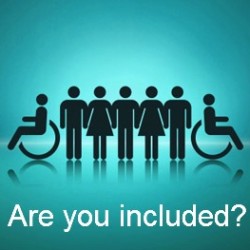 I'm working on a project to assess corporate diversity initiatives in the county where I work and live. That information will then be used to further other work I am doing. My crystal ball says that with the exception of a handful of Fortune 500's and the 30+ government contractorsthat have operations here - there won't be much to look at.
I'm working on a project to assess corporate diversity initiatives in the county where I work and live. That information will then be used to further other work I am doing. My crystal ball says that with the exception of a handful of Fortune 500's and the 30+ government contractorsthat have operations here - there won't be much to look at.
I live in small town USA but I don't accept that as an excuse.
I predict I'll find that the majority of the companies with some type of diversity initiative address only the most commonly thought of areas - and thatvery few organizations have a definition of diversity that extends beyond race, gender, ethnicity and sexual orientation. Now, I am not saying those are not important - no, not at all. In fact, those particular aspects of diversity have largely still not seen equality.
There's simply more to a well rounded diverse workforce.
The purpose of this letter is to restate for all of the supervisorypersonnel of the IBM Company the policy of this corporation regarding thehiring of personnel with specific reference to race, color, or creed.Under the American system, each of the citizens of this country hasan equal right to live and work in America. It is the policy of this organizationto hire people who have the personality, talent and background necessaryto fill a given job, regardless of race, color or creed.If everyone in IBM who hires new employees will observe this rule,the corporation will obtain the type of people it requires, and at the sametime we will be affording an equal opportunity to all in accordance withAmerican tradition. -T. J. Watson, Jr. (September 21, 1953)
The idea that every citizen has a right to live and work seems so basic yet still to this day is unachieveable andUtopian. I don't know if Watson was concerned only with 'race, color and creed' or if that was just a string of colloquialspeech- but whatever, it was a damn good start on inclusive employment practices in its day, issued in fact one year before the U.S. Supreme Court decision in Brown vs. Board of Education and over a decade before the Civil Rights Act of 1964.It certainly put IBM on the map of corporate diversity leadership forever.
But like I said, today it isn't enough.Today, it isn't only skin color and one of the genders that float 'diversity' - and it's not only about the other EEOC prohibited employment policies and practices either:
Under the laws enforced by EEOC, it is illegal to discriminate against someone (applicant or employee) because of that person's race, color, religion, sex (including pregnancy), national origin, age (40 or older), disability or genetic information. It is also illegal to retaliate against a person because he or she complained about discrimination, filed a charge of discrimination, or participated in an employment discrimination investigation or lawsuit. - Equal Opportunity Employment Commission
It's much more than that, and though it isn't done for philosophical or Utopian reasons (it's done for market share and money), leading companies know that each individual brings to work each day a unique set of characteristics and circumstances along with their skills and talents. They know that broadening the backgrounds, experiences, cultures and attributes of their employees helps to create a brand that will appeal to a very broad consumer and client base. And it creates more opportunity for more people. And that's exactly what my plan for world domination is. And that's good.
Here is a list of the varied attributes that companies who lead in workforce diversity embrace today to include but also move above and beyond Federal mandates, as identified through Universum's 2011My Future Career Surveygiven to college students and published by Diversity Employers. Definitely something to think about and assess how many beyond what the law requires are respected in your workplace and places that you do business.
- Age
- Citizen of a foreign country
- Disability
- Dual/multi citizenship (US and other countries)
- Education
- Ethnicity
- Gender
- International work experience
- Language skills
- Life experience
- Marital status
- Multicultural/multiethnic background
- Nationality
- Parenting experience
- Personality
- Physical disability
- Religion
- Sexual Orientation (GLBT)
- Socio-economic background
- Veteran/military experience
- Work experience in different industries
- Work function
- Work style
The results of student employer perception for 2011 are published by Universum in a Top 100 list.
So, how does the company you work for stack up?
P.S. IBM remains a leader in workforce and supplier diversity today though expansion of the definition of 'diversity' and inclusive employment practices.
Leave a Reply